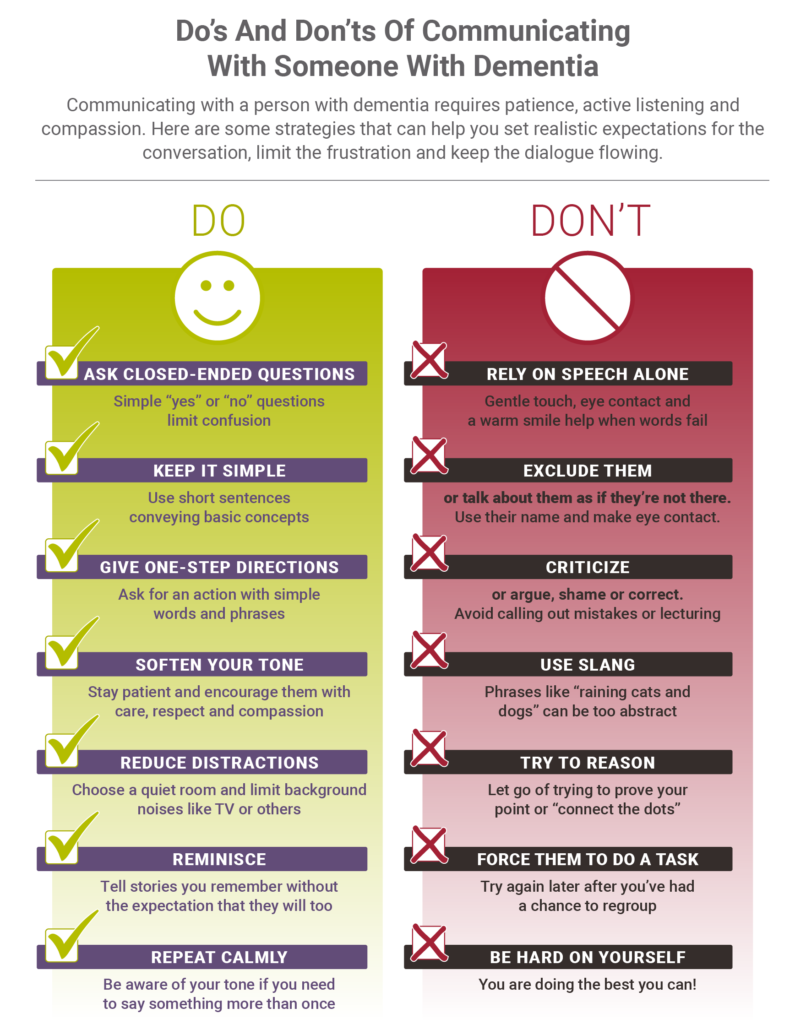A monthly article brought to you by Senior Services Memory Support Programs
Do you struggle in conversing with a friend or family member that is living with dementia? Perhaps the conversation used to flow easily, but now the conversation dries up quickly. Or perhaps you are trying to avoid certain subjects as you are fearful of upsetting them. Or maybe because of the cognitive change they are experiencing, they repeat themselves so frequently that now you both are caught saying the same things, answering the same questions. Or perhaps they are just plain frustrated. Try these simple tips to keep a conversation going with someone who has dementia, and hopefully it will be more enjoyable for both of you.
Be aware of body language.
- Try being at eye level with the person, so that they can see your face, facial expressions, etc.
- Smile! The person experiencing cognitive change is looking to you- the more you smile, the more they will, and the more relaxed you both will be!
- Be aware of your body language as well as theirs.
Slow down
- Try to not complicate the conversation with several questions that may be difficult to answer and/or understand.
- Try to avoid open-ended questions. If you are looking for an answer, for example “what would you like to drink”, try offering 2 choices with the question. “Would you like coffee or juice this morning?”
- If the person is living with more advanced cognitive change, try using a visual cue to help them answer.
Touch
- Many times words are not needed to convey a message. Touch can be a very powerful mode of communication. For example, holding the person’s hand can convey to them instantly that you are someone they can trust and that they are safe.
Try Reminiscing
- Everyone enjoys a trip down memory lane! Use a photo album or picture book to help support you in the conversation, and to help keep it going! Be mindful of the person’s cognitive loss and where it is, as they may not recall some life events, and you certainly are not trying to cause distress.
Be Patient
- The conversation may not be as quick as it once was. This doesn’t mean that you should try to hurry the person through the conversation, or speak for them. Encourage the person to continue to talk, as this can help them to continue to engage in life around them, and can assist in preserving language skills. Take a breath, count to five, smile and relax. By doing this, you are giving them time to finish what they were intending to. Also, be mindful to slow down your speech. The person living with the cognitive change needs more time now to process what has been said and how to respond.
Respond to the Emotion
- Feelings and emotion that are being expressed can be more important than what is actually being said. Try to avoid correcting the person if they say something inaccurate. If they are happy, laughing, and enjoying themselves within the conversation, correcting them may change the moment.
Silence is Ok
- There are times where silence is a good thing. Sitting in a peaceful silence can be comforting and relaxing to a person with dementia. We, as caregivers, often feel that we need to keep talking and entertaining the person with dementia, when the opposite is actually true. If silence is hard on you as the caregiver, try having some light background noise, such as their favorite music. This may help you to relax some too.
When you start to notice memory changes, seeking early detection is key. Senior Services offers an array of memory support programs including confidential memory screenings to obtain a cognitive baseline, early memory loss programs, and educational classes along with support from Seasons Adult Day Health Services. If you or someone you know is experiencing increasing changes with their memory and could benefit from additional services, please contact Amy Sheridan, Family Support and Activity Manager at 989-633-3764.
Check out our section, Our Mind Matters, next month as we discuss holiday traditions and gatherings.

